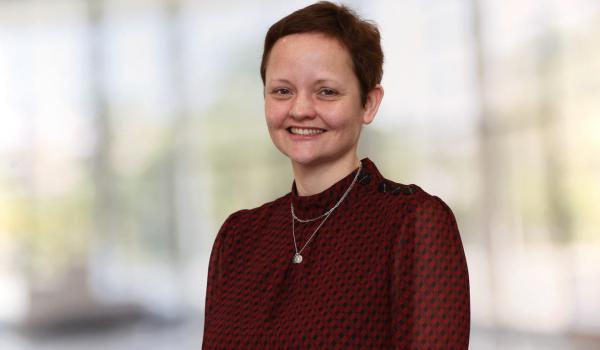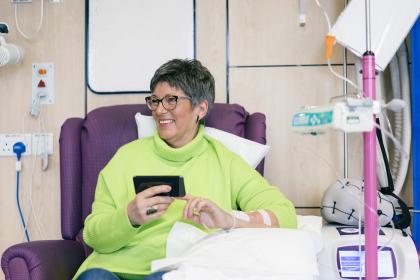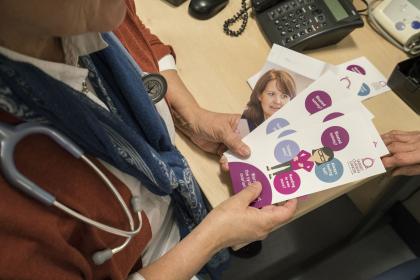Nearly half of GPs (44 per cent) mistakenly believe symptoms are only present in the later stages of ovarian cancer.⁶ Katy knew very early on that something wasn’t quite right. Here she explains the importance of knowing your body, raising symptoms awareness and how a fluke case of appendicitis may well have saved her life.
I found out I had ovarian cancer completely by fluke. After my diagnosis I was told that I would never have had symptoms at such an early stage – but I did. We know our bodies best, and I find it terrifying that sometimes doctors don’t ask questions or just pass things off. If I hadn’t had an appendicitis, I might be sitting here now with the cancer growing inside me. I might not have made it to 50.
Fluke
I was so tired all the time.
I was a busy estate agent with two teenagers – both of whom were being home-schooled during the pandemic, so initially I thought maybe the fatigue was related to my workload. I was also heading towards the menopause and my symptoms just seemed like another part of that. Still, I couldn’t shake the feeling that something just wasn’t quite right. I decided to make an appointment to see my GP but although I was referred for further blood tests, the initial recommendation was a prescription for more iron tablets. The tests also showed up that I was fighting an infection, but no further investigations were suggested. The tablets didn’t help, and I soon began to struggle with bloating and needing to get up during the night to wee more often.
Things might have gone on like that for months if not for a fluke diagnosis of appendicitis. One evening, after some drinks with friends, I suddenly began to experience some pain in my right side. I called my dad – he’s a retired GP – and he came over to examine me. He told me that if I were his patient, he’d be sending me straight to A&E. Because of the pandemic I had to go to the hospital alone. After a series of tests, I was diagnosed with appendicitis, fibroids, ovarian cyst and potentially cancerous cells in my left ovary. My symptoms had seemed so normal and run-of-the-mill. It was terrifying. Shortly after I was given a diagnosis of high grade serous carcinoma.
Missing pieces
I underwent a complete hysterectomy and six rounds of chemotherapy. Since finishing treatment things have been going well. I’ll have CA125 blood tests every three months for the first year and then one every six months.
During treatment I was incorrectly told that I couldn’t take HRT – which was difficult because the symptoms were having a significant impact on my life. Fortunately, I was later referred to a menopause doctor who did further research and confirmed it was okay for me to start taking HRT as my cancer type was not hormone receptive. This made a huge difference in the quality of my life, and I was able to go back to work. I’m grateful that someone took the time to do further research and work out how best to make things easier for me. We all need personalised care. Unfortunately this was not available to me on the NHS.
Before my diagnosis I didn’t know anything about ovarian cancer – not the symptoms, not anything. Now I’m passionate about raising awareness and ensuring other women receive a continuity of care. The way Target Ovarian Cancer pushes for GP training is fundamental. Not every GP knows your history – I saw multiple doctors – and it can be like looking at a jigsaw with lots of missing pieces. I know the NHS is very stretched, and this is having a huge impact on cancer as an illness across the board. But this shouldn’t stop us spreading the message about symptoms awareness and the importance of knowing your body. If something’s not right, you have to push for tests – you know your body better than anyone else.
If you’ve been affected by this story and would like to speak to a specialist nurse, you can call our dedicated support line on 020 7923 5475 or contact us: [email protected]. We're open from 9am until 5.30pm, Monday to Friday.





